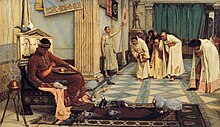
Back 423 Abkhazian 423 Afrikaans 423 ALS 423 እ.ኤ.አ. Amharic 423 AN 423 Arabic 423 AST 423 Azerbaijani ۴۲۳ (میلادی) AZB 423 Byelorussian
| Millennium: | 1st millennium |
|---|---|
| Centuries: | |
| Decades: | |
| Years: |
| 423 by topic |
|---|
| Leaders |
| Categories |
| Gregorian calendar | 423 CDXXIII |
| Ab urbe condita | 1176 |
| Assyrian calendar | 5173 |
| Balinese saka calendar | 344–345 |
| Bengali calendar | −170 |
| Berber calendar | 1373 |
| Buddhist calendar | 967 |
| Burmese calendar | −215 |
| Byzantine calendar | 5931–5932 |
| Chinese calendar | 壬戌年 (Water Dog) 3120 or 2913 — to — 癸亥年 (Water Pig) 3121 or 2914 |
| Coptic calendar | 139–140 |
| Discordian calendar | 1589 |
| Ethiopian calendar | 415–416 |
| Hebrew calendar | 4183–4184 |
| Hindu calendars | |
| - Vikram Samvat | 479–480 |
| - Shaka Samvat | 344–345 |
| - Kali Yuga | 3523–3524 |
| Holocene calendar | 10423 |
| Iranian calendar | 199 BP – 198 BP |
| Islamic calendar | 205 BH – 204 BH |
| Javanese calendar | 307–308 |
| Julian calendar | 423 CDXXIII |
| Korean calendar | 2756 |
| Minguo calendar | 1489 before ROC 民前1489年 |
| Nanakshahi calendar | −1045 |
| Seleucid era | 734/735 AG |
| Thai solar calendar | 965–966 |
| Tibetan calendar | 阳水狗年 (male Water-Dog) 549 or 168 or −604 — to — 阴水猪年 (female Water-Pig) 550 or 169 or −603 |

Year 423 (CDXXIII) was a common year starting on Monday (link will display the full calendar) of the Julian calendar. At the time, it was known in Rome as the Year of the Consulship of Marinianus and Asclepiodotus (or, less frequently, year 1176 Ab urbe condita). The denomination 423 for this year has been used since the early medieval period, when the Anno Domini calendar era became the prevalent method in Europe for naming years.